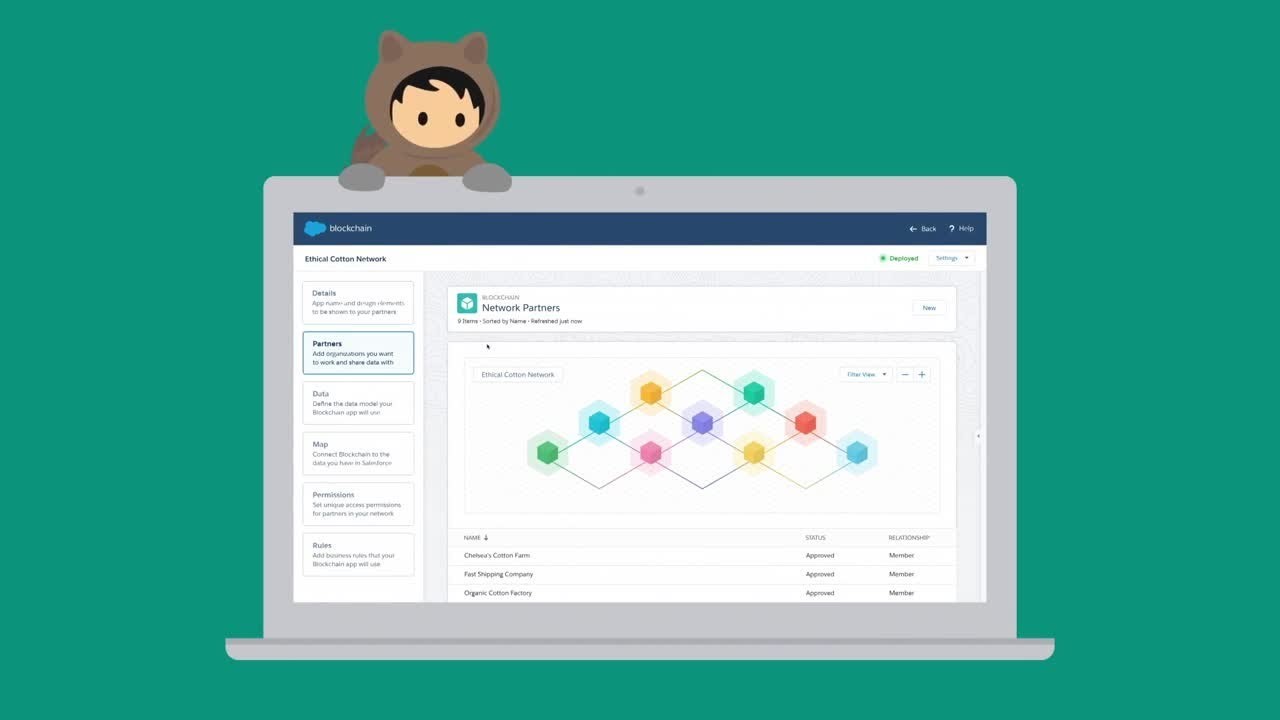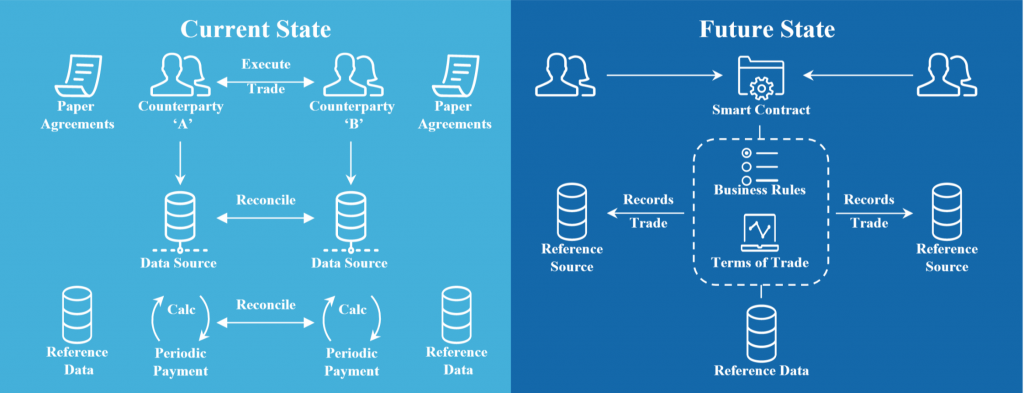Smart contracts are the most disruptive enterprise application of blockchain technologies and will continue to create new efficiencies for the financial services industry. They allow for a reliable and enforceable means of aligning multiple parties across a decentralized platform. When Nick Szabo developed the concept of smart contracts in the early 1990’s, blockchains and the subsequent hype surrounding them did not yet exist. Now, the decentralized and trust-based nature of blockchains give smart contracts the necessary platform for reaching more widespread applications in the business environment.
Smart contracts create previously unrealized efficiencies and new opportunities for many business processes; however, the code heavy nature of the technology has historically been a major barrier-to-entry. This has led to a growing need for a scant number of technical developers that not only understand the intricacies of building sophisticated blockchain networks, but also have a deep fundamental understanding of the end user’s business needs. That knowledge scarcity seemed to be the leading factor consistently restraining the enterprise potential of smart contracts. However, Salesforce blockchain eliminates the dependency on building blockchains from lines of code. Instead, users may use the same intuitive drag and drop interface from the world’s leading CRM platform: Salesforce. Smart contracts on the Salesforce blockchain, replace the resource intensive development cycles of other blockchain solutions with easy to use functionality.

What is a “Smart Contract” Anyway?
Smart contracts are self-verifiable, self-executable, and tamper proof contracts that exist digitally. At their core, smart contracts are computer programs collectively developed and agreed upon by two or more. This computer code verifies, executes, and enforces the terms of the contract if / when they are met. While this intermediary verification and enforcement role has often been reserved for an individual or institution, smart contracts are a way to remove the resource intensive and error prone third party from the equation. Instead, a secure and trusted decentralized blockchain takes their place as the intermediator that verifies and enforces the agreement both parties previously determined.

Advantages of Smart Contracts on Salesforce Blockchain:
1. Start by defining the trust network, its rules, and permissions. Blockchains are an effective means of uniting participants from different entities under a single network. However, not all of the participants necessarily need the same access to data in the network or the permission to modify that data in the same way. Salesforce blockchains are permissioned, meaning that the network agrees on what sort of information each network participant may view, as well as if / how they are able to modify that information.
2. Create a low-code data model directly on blockchain. Many of the same fields that would be necessary terms of the smart contract are already common objects and fields within Salesforce. Creating a smart contract and filling in these crucial pieces of information is just as straight forward and foolproof as working through other standard processes in Salesforce.
3. Make blockchain data actionable. Because Salesforce Blockchain is directly linked with the Salesforce Lightning platform, smart contract terms can easily be linked to Salesforce platform events, opportunities, and more to directly reflect the outcomes of the smart contract within the Salesforce environment. No need to go back to Salesforce and manually update the platform based upon the predetermined conditions of the smart contract. This is built into the contract!
4. Easily create apps for all partners and invite them. Entities that are already Salesforce customers have direct insight into the information shared with other participants on the Salesforce blockchain network. Entities that are not Salesforce customers can utilize Heroku or any custom framework to have the same blockchain data be available outside of Salesforce as well. This allows all firms to participate in the efficiency gains of blockchain technology without having to be a Salesforce customer themselves.
Smart Contracts & Derivatives
As with traditional contracts, smart contracts are used when multiple parties need to enforce all participants to adhere to a set of terms. Most often, there are circumstances surrounding these terms that require the participating entities to independently verify each other’s work. Smart contracts are appropriate when:
- More than one entity requires access to the blockchain ledger
- There are potential misalignment issues as to who controls the data
- There is a need for robust data integrity protections and a tamper proof auditable trail for all changes to the data
Smart contracts can be used to create efficiencies in post trade processes by removing the duplicative efforts of each counterparty independently verifying and executing trades. They enable a standardized and predetermined set of terms to create efficiencies in the post-trade processing of over-the-counter derivatives. Smart contracts also enable real-time valuation of positions, allowing for more transparent monitoring and reductions of costly errors. Following the predetermined business rules and terms of trade set by both parties, smart contracts streamline the reconciliation process as well. Salesforce blockchain’s functionality means digitally building secure and executable contracts for sophisticated business processes is an intuitive and efficient way of building enforceable agreements.

Future of Smart Contracts
Smart contracts built on Salesforce Blockchain are poised to disrupt the role intermediaries play across several industries. Individuals are able to manage their digital identity by only enabling the necessary details of their personal identity to be viewed by the required entities. Supply chains are more easily auditable for all parties involved at each stage, allowing for more effective planning and real time insights. Rather than having to wait for an intermediary to update subsequent lines of the supply chain, all participants have a clear understanding of everyone else’s current status. Loan processing and verification will shift from disjointed paper-based forms for verification by an intermediary to easily fillable drop down menus. Transfers of funds or knowledge today that require an intermediary verifying all participating entities can be replaced by the secure, verifiable, and self-executing smart contract on the blockchain.
Summary
Smart contracts on the Salesforce blockchain will revolutionize several business processes relevant to the financial services industry. FinServ has been considering the efficiency gains associated with Salesforce blockchain as well as the usability and process flows of working in the system. As a Salesforce Consulting Partner, FinServ will be joining several other leaders from their respective industries in testing and vetting the Salesforce blockchain platform to ensure that it meets the sophisticated needs of our customers. We are excited to see what benefits Salesforce blockchain and its ability to easily develop smart contracts will soon bring to the financial services industry. If you would like to learn more about the Salesforce blockchain network or other FinServ capabilities, please reach out to us at info@finservconsulting.com or give us a call (646) 603-3799.
About FinServ Consulting
FinServ Consulting is an independent experienced provider of business consulting, systems development, and integration services to alternative asset managers, global banks and their service providers. Founded in 2005, FinServ delivers customized world-class business and IT consulting services for the front, middle and back office, providing managers with optimal and first-class operating environments to support all investment styles and future asset growth. The FinServ team brings a wealth of experience from working with the largest and most complex asset management firms and global banks in the world.

